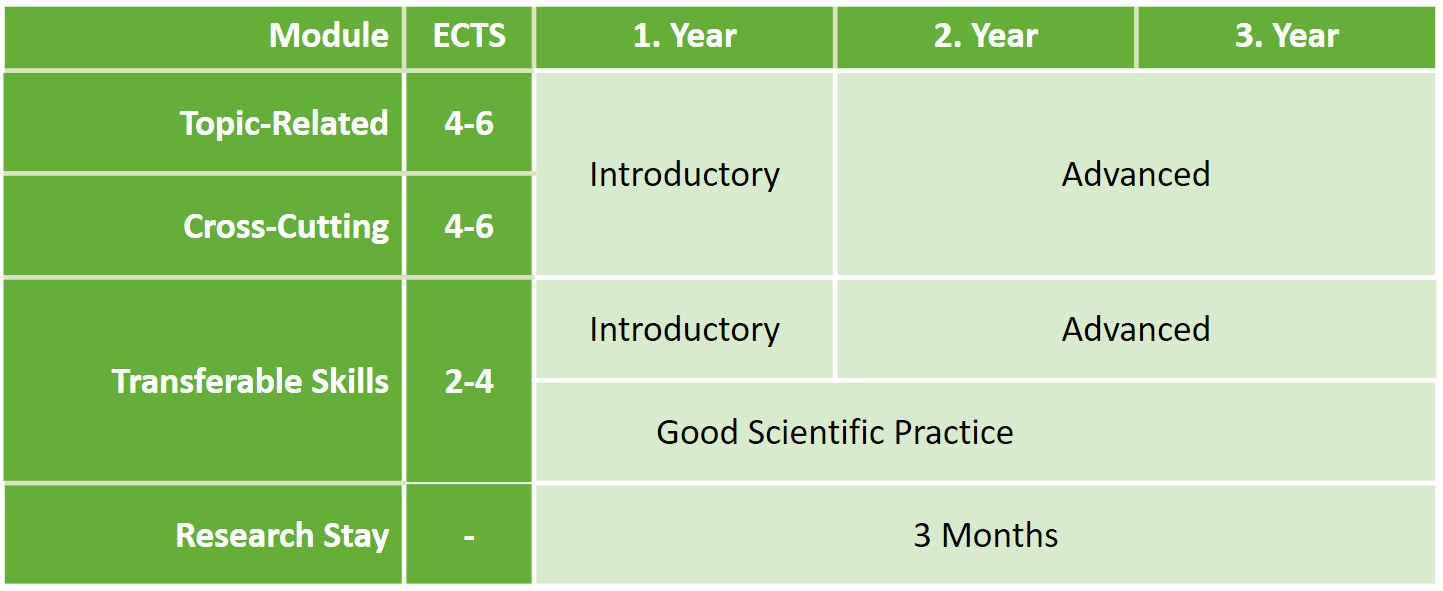Curriculum Structure

The Graduate School GRACE offers different categories of educational modules in a structured well-balanced framework to support defined types of skills, the graduate school intends to develop. GRACE PhD students have the opportunity to take part in a curriculum of three module categories:
Topic-Related Module
In a given topic, three different types of modules (introductory, advanced, case study) can be offered to develop the topic-related skills of the PhD students. All PhD students specialized in the addressed topic are considered as participants. In order to ensure comparability and compatibility of the graduate education in the different topics, the modules have the same principle structure in terms of type offered and schedule.
Introductory modules will provide theoretical and methodological fundamentals in the field of expertise. They are organized as lecture series with a mandatory participation of the PhD students. This will form a common basis across PhD students coming from different disciplinary backgrounds. The introductory modules are scheduled in the first year of the PhD. Advanced modules scheduled in the second and third year will additionally provide cutting-edge approaches and methods. Thus, international trends and important novel results can directly be integrated into the graduate education. Depending on the field, the advanced modules are designed as series of compact courses, year-long weekly lectures, talks or practical work. Internationally renowned scientists as lecturers will be involved. Additionally, case study modules may be part of the curricula. They are designed to give the PhD students opportunities to apply their interdisciplinary skills in practical work. These modules pay special attention to the system analysis of complex environmental challenges in selected research places. The module is scheduled in the second half of the second and the third year.
Cross-Cutting Module
Analyzing and understanding complex environmental systems with the objective to develop sustainable solutions demands across all topics the integration of specific methodical application-oriented knowledge (remote sensing, modeling, ...). Additionally, the development of skills concerning system analysis and interpretation has a high relevance for the PhD work and the future career. Due to the importance of these skills, GRACE has defined a separate category with cross-cutting modules. The modules are offered on the introductory and advanced level – the former being mandatory and scheduled for the first year while the advanced modules are offered the following periods.
Transferable Skills Module
The third element of the curriculum focusses on the development of personal competence skills important for the PhD work and further scientific career.
A basis for this module is the Further Education Program of the Karlsruhe House of Young Scientists (KHYS) addressing topics like science communication, project management, proposal writing or career development.
In addition, often requested topics are covered by exclusive in-house workshops that are offered at regular intervals throughout the semester. The range of subjects spans from presentation techniques and scientific writing to seminars on ethical and legal orientation in the daily research routine.
